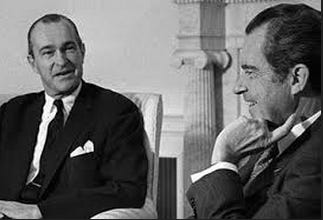Is Tucker Carlson Right about the CIA, Nixon, and JFK?
The Fox News host tells a mostly true story in service of insurrectionary politics
On Thursday night Tucker Carlson returned to the theme of JFK’s assassination in a diatribe entitled “Biden and the Deep State,” in which he argued (wrongly, I believe) that the president is out to “destroy America,” and that President Richard Nixon was “removed for questioning the deep state” (which is factually incorrect).
But Carlson’s argument is also grounded in fact. He declaimed:
On June 23, 1972, Nixon met with the then-CIA director, Richard Helms, at the White House. During the conversation -- which thankfully was tape recorded -- Nixon suggested he knew, quote, "who shot John," meaning President John F. Kennedy. Nixon further implied that the CIA was directly involved in Kennedy's assassination, which we now know it was. Helms' telling response? Total silence.
Media Matters For America, the tireless Fox News watchdog, highlighted Carlson’s comments with the unstated implication that they are false or misleading.
I feel obligated to fact check Carlson’s story because it is drawn—unattributed —from my book Scorpions’ Dance, published by St. Martin’s Press in June 2022. The book tells the story the Machiavellian relationship of Nixon and Helms, two masters of power who shared hard-line anti-communist politics while deeply mistrusting each other. In Chapter 16, entitled “The Who Shot John Angle,” I documented and explained Nixon and Helms’ previously overlooked conversation about JFK’s assassination.
Is Carlson right? Did this conversation take place? Did Nixon know who killed JFK? Was Nixon removed for questioning the “deep state?”
Keep reading with a 7-day free trial
Subscribe to JFK Facts to keep reading this post and get 7 days of free access to the full post archives.





